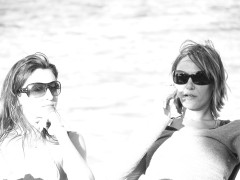Interview: Alessandra Magnaghi and Ortensia Visconti

Alessandra Magnaghi and Ortensia Visconti’s Fidelity is a portrait of a complicated Cuban society, allegedly destined to disappear with its leader. In this interview they talk to Kamila Kuc about the nature of their collaboration and about exploring and filming the island.
Kamila Kuc: How did your collaboration on Fidelity start?
Alessandra Magnaghi: Ortensia and I were already good friends before we decided to work together. For two and half years we’ve been shooting, editing and creating Fidelity. It has been a terrific experience: fun, some difficult moments but it was always unexpected.
Ortensia Visconti: Working with Alessandra was great. Not only because I had fun doing it, but it was also an opportunity to discover and improve our knowlege of the subject through our discussions and a real life experience.
KK: What will happen to all the subjects you interviewed? I mean people who expressed their disappointment with Castro’s politics…
AM&OV: We were worried too. We always asked everyone we interviewed about the risks they could be taking, but they told us that generally it’s not as dangerous to speak as it once was. They always spoke to us knowing the risks involved.
KK: Conversely, do you think that the ones who praised Castro were honest with you, or were they just afraid to tell the truth?
OV: I can’t say if they were honest or lying: this is something that the viewers should guess themselves after seeing the documentary. The only sure thing is that the camera doesn’t lie.
AM: I think they were honest. Possibly because they grew up in a propaganda system, but they didn’t lie. Cuba is a place full of contradictions: many Cubans criticize the system, but only few of them hate Castro.
KK: Many characters in the film admire and idolize Castro. I find this strong devotion to the dictator somehow disturbing and it seems like those who are well off, like the actress Maria Antonia, are more in favour of his politics. Who do you think would make an ideal new leader?
OV: Obama would be perfect.
AM: I don’t know, under Fidel no political class was able to develop, and this is a problem. At present I appreciate Raul Castro. Of course he is not the future, but can be a good transition.
KK: Current situation in Cuba makes me think of the Stalinist Russia, where after Stalin’s death many Russians said that they were better off under the dictatorship, because of good healthcare system, education, etc. The Cubans in Fidelity give similar reasons….
AM: It’s true, healthcare and education are typical steps in a dictatorship. Fidel is a Big Father that feed people and tell them how to think. The only problem with health is the lack of money, while education provides the basis of a constant brainwashing. A lot of Cubans are tired of that.
OV: Many people in Cuba say that the country isn’t communist, but Fidelist. Fidel, before to become a dictator, was a revolutionnary and a national hero. Health and education for poor people didn’t exist in Cuba. The country was called the “brothel of the USA”. I think that some older people are still greatfull for those things, and nostalgic of their youth.
KK: How did you manage to film out there? Did you get a permission?
AM: We were not allowed to film, of course. In that period the Government didn’t issue any journalistic visa.
OV: We didn’t have any permission. We just were really carefull and tried to look like tourists.
KK: ‘Dear Comandante, I would like to have an ounce of your power, so I could send someone to come and get you. To imprison you so you would have the chance to rot in a hole and reflect on your bullshit…’ Ortensia, this is an opening line of your Open Letter to Fidel Castro (2007), in which you compare Castro to a jealous husband. Can you tell us more about the letter?
OV: In the Open letter to Fidel Castro the voice is one of a Cuban woman (it is a fiction), not mine. I don’t want to give my opinion if I can give the opinion of a Cuban. Alessandra and I employed the same tactic for the documentary. We wanted the spectator to form his/her own opinion through watching the film, without ever imposing ours. Their opinion is based on their life experience, mine only on my personality.
AM: I don’t like dictatorships, so I don’t like Castro’s politics. Above all I think that he failed to build a good economic system. But I think he was right when he nationalized the industries, for example. Cuba belonged to the United States, and I don’t like that kind of “democracy”.
KK: What is the situation with documenary filmmaking in Italy at the moment? How easy/difficult it is to get funding?
AM&OV: There isn’t a great market of Italian documentaries. You see them mostly at festivals, so it’s not easy to get funding. We did produce it ourselves. I hope the next one will be easier.
KK: What would you say is the aim of documentary filmmaking? Do you think that your documentary will somehow contribute to a socio-political revolution/change in Cuba?
AM: No, I think that only Cubans can change Cuba – and they don’t need a documentary to do it. A documentary can be a witness, and if it’s good it can even inspire people. But you need people to act.
OV: I think the aim is the same as journalism. To inform. But I also think that they had enough Revolutions in Cuba. I wish them a peaceful transition.
To read a review of the film, click here.

